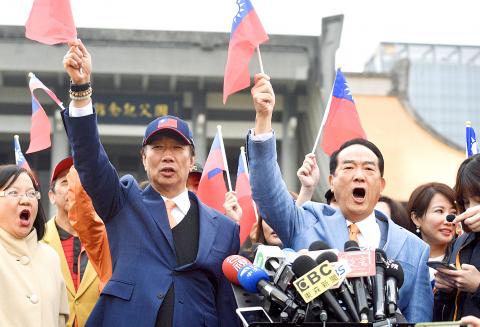The Democratic Progressive Party (DPP) caucus used the tyranny of the majority to ensure the Anti-infiltration Act (反滲透法) passed on Tuesday, People First Party (PFP) Chairman James Soong (宋楚瑜), the party’s presidential candidate, said yesterday.
DPP legislators got the act passed without “coordination among government agencies, establishing enforcement rules or designating an administrative agency to oversee the act’s enforcement,” Soong said, adding that people’s rights would be violated because of the act.
Soong spoke against the act’s passage after attending an early morning flag-raising ceremony at Sun Yat-Sen Memorial Hall, saying that the act would cause Taiwanese who frequently do business or engage in cultural activities and tourism in China to fear for their lives.

Photo: Peter Lo, Taipei Times
“There are 2 million Taiwanese businesspeople in China and they need to attend a lot of activities there. In the future, they and their family members will need to prove to themselves that they are not doing anything to threaten national security. They will be presumed guilty and it will be their responsibility to prove their innocence,” Soong said, adding that the DPP would function like the Taiwan Garrison Command, which suppressed dissidents during the Martial Law era.
People falsely accused of breaching the act would not be able to appeal, which is a complete violation of human rights, he added.
Soong also said at a news conference on Tuesday night that the DPP was so eager to have the act passed before the presidential and legislative elections on Saturday next week, because it apparently intends to use it to influence the results.
“The act pits supporters of different candidates against one another and reinforces people’s anxieties about losing the nation someday if China’s influence and infiltration efforts go unchecked. Passage of the act is of direct benefit to the DPP. We strongly protest this immoral move, which has caused the nation’s democracy to backslide,” he said.
The DPP must not forget that he and other party pioneers worked together 30 years ago to amend Article 100 of the Criminal Code so that no one could be imprisoned for their political beliefs, Soong said, adding that passage of the Anti-infiltration Act is “green terror,” with many viewing it as something the authoritarian regime of the past would have done.
People should not underestimate the act’s impact, as it affects them, as well as their families, friends and classmates, he said, adding that allegations against them could be fabricated.
National security is a collective responsibility, but procedural justice and solid evidence is needed before someone can be proven guilty, Soong said, adding that people should not think that they must compromise their political beliefs just because they do not back the DPP.
Soong urged people to show that they are unwilling to compromise by who they vote for on Saturday next week.
“The elections need to ensure that our democratic values and rights will not be permanently damaged,” Soong said. “If we want to be in charge of the nation again, we should first let the DPP, a party that acts like a bully and a dictator, lose the power to govern by putting into action the votes in our hands.”

Alain Robert, known as the "French Spider-Man," praised Alex Honnold as exceptionally well-prepared after the US climber completed a free solo ascent of Taipei 101 yesterday. Robert said Honnold's ascent of the 508m-tall skyscraper in just more than one-and-a-half hours without using safety ropes or equipment was a remarkable achievement. "This is my life," he said in an interview conducted in French, adding that he liked the feeling of being "on the edge of danger." The 63-year-old Frenchman climbed Taipei 101 using ropes in December 2004, taking about four hours to reach the top. On a one-to-10 scale of difficulty, Robert said Taipei 101

Nipah virus infection is to be officially listed as a category 5 notifiable infectious disease in Taiwan in March, while clinical treatment guidelines are being formulated, the Centers for Disease Control (CDC) said yesterday. With Nipah infections being reported in other countries and considering its relatively high fatality rate, the centers on Jan. 16 announced that it would be listed as a notifiable infectious disease to bolster the nation’s systematic early warning system and increase public awareness, the CDC said. Bangladesh reported four fatal cases last year in separate districts, with three linked to raw date palm sap consumption, CDC Epidemic Intelligence

Two Taiwanese prosecutors were questioned by Chinese security personnel at their hotel during a trip to China’s Henan Province this month, the Mainland Affairs Council (MAC) said yesterday. The officers had personal information on the prosecutors, including “when they were assigned to their posts, their work locations and job titles,” MAC Deputy Minister and spokesman Liang Wen-chieh (梁文傑) said. On top of asking about their agencies and positions, the officers also questioned the prosecutors about the Cross-Strait Joint Crime-Fighting and Judicial Mutual Assistance Agreement, a pact that serves as the framework for Taiwan-China cooperation on combating crime and providing judicial assistance, Liang

US climber Alex Honnold left Taiwan this morning a day after completing a free-solo ascent of Taipei 101, a feat that drew cheers from onlookers and gained widespread international attention. Honnold yesterday scaled the 101-story skyscraper without a rope or safety harness. The climb — the highest urban free-solo ascent ever attempted — took just more than 90 minutes and was streamed live on Netflix. It was covered by major international news outlets including CNN, the New York Times, the Guardian and the Wall Street Journal. As Honnold prepared to leave Taiwan today, he attracted a crowd when he and his wife, Sanni,